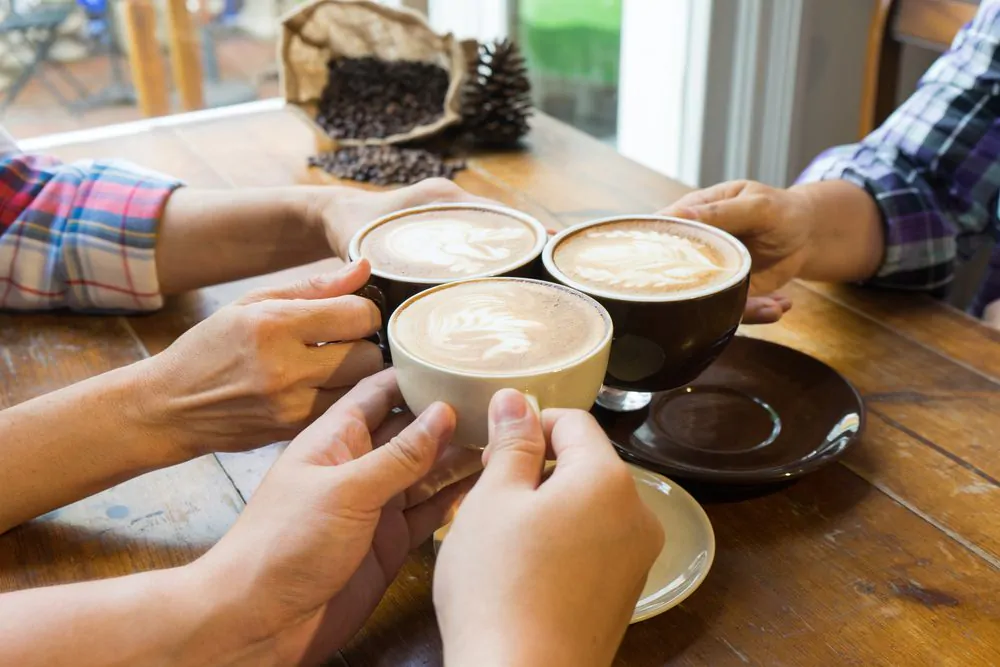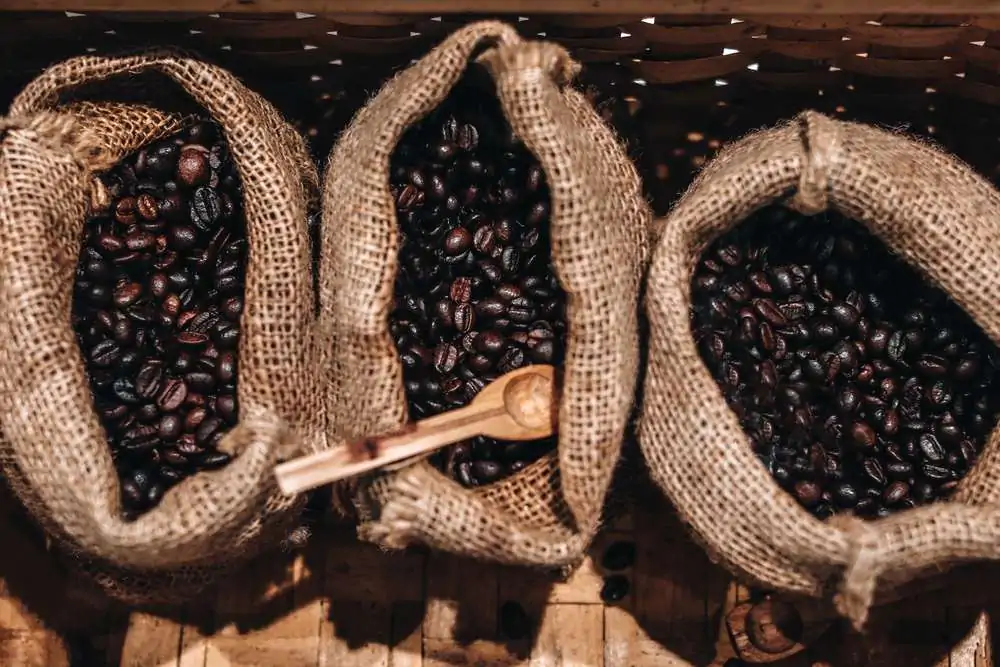Coffee consumption isn’t slowing down, and with so many coffee drinkers worldwide, rumors are inevitable. We’ll debunk several common coffee myths.

Coffee is one of the most popular drinks in the world, with approximately two billion cups of coffee being consumed daily. With so many coffee drinkers striking up conversations around their morning brew every day, rumors are bound to spread. From claims about how certain roasts have more caffeine to the belief that coffee makes you sober, there is no shortage of coffee myths.
We’ve compiled some common coffee myths to debunk. Let’s dive in. You might also be interested in our explainer on how many people in the world drink coffee.
- 1. Coffee Will Sober You Up
- 2. Espresso Dehydrates You
- 3. Coffee Stunts Your Growth
- 4. Drinking Coffee Will Keep You Up All Night
- 5. Decaf Means Caffeine-Free
- 6. Coffee Helps You Lose Weight
- 7. Boil Water Before You Make Coffee
- 8. Coffee Is Bad For Your Heart
- 9. You Can’t Drink Decaf During Pregnancy
- 10. Coffee Has Toxic Mold
- 11. Dark Roast Has More Caffeine
- 12. Adding Milk Reduces The Caffeine Content
1. Coffee Will Sober You Up
Unfortunately, this is one of the most enduring coffee myths. Coffee will not sober you up. Drinking a cup of coffee won’t get rid of the alcohol in your body; it just makes you feel more alert.
Out of all the coffee myths, this is the most dangerous, as people may get behind the wheel thinking they’re sobering up. The truth is, once you’ve had any alcohol, you shouldn’t drive.
The only way to sober up is to stop drinking alcohol altogether and give your body enough time to process it. How quickly your blood alcohol levels drop depends on how much you drank, your weight, age, and other factors, but generally, the liver can metabolize a shot every hour, while other drinks take longer. Since you have no way to tell for sure if the alcohol has passed through your system, it’s best to stay out of the driver’s seat.
2. Espresso Dehydrates You
In theory, this coffee myth is not baseless; coffee is a mild diuretic, meaning it will make you urinate. Naturally, people began to fear that coffee was dehydrating them. The good news is there is nothing to suggest it will lead to substantial fluid loss.
If anything, since coffee is mostly made of water, it’s not a bad source of hydration. With that said, water should be your main source of fluids. You might also be interested in our list of coffee facts.
3. Coffee Stunts Your Growth
Growing up, you were probably discouraged from drinking coffee by your parents, who claimed it would stunt your growth or cause osteoporosis.
The belief that coffee stunts your growth came to be when studies found that coffee can leach calcium from your bones. The amount of calcium lost is negligible if you’re already following a balanced diet and are healthy. You lose so little calcium it can be replaced by two tablespoons of milk.
Since most people add milk to their coffee, there’s nothing to worry about! What should be more of a concern is that coffee and tea inhibit iron absorption. So don’t drink coffee or tea at mealtimes if you’re anemic.
4. Drinking Coffee Will Keep You Up All Night
As far as coffee myths go, this one also wasn’t pulled from thin air. Coffee can keep you up at night, but it depends on your caffeine tolerance and the amount of caffeine you have in your system when you try to wind down for bed.
The half-life of caffeine is approximately five hours for the average person. So if you have a cup of coffee at 5 PM and hit the hay at 10 PM, then half the caffeine will already be out of your system.
If you’re concerned about caffeine affecting your sleep, then avoid drinking coffee at least five hours before bed. Some people are more sensitive to caffeine than others. If you’re still feeling jittery hours after the fact, then have coffee very early in the day or switch to decaf.
5. Decaf Means Caffeine-Free

Decaf coffee is a great alternative for people whose caffeine intake is too high and those who are sensitive to its effects. However, it isn’t fully caffeine-free.
In the European Union, decaf coffee must be 99.9% caffeine-free, but there’s a little bit more leeway in the US, where the requirement is 97% caffeine-free.
For American coffee lovers, an average 8-ounce cup of decaf coffee will still contain around 4 mg of caffeine. For comparison, a regular cup of the same size could have 70 to 140 mg of caffeine. The amount in decaf is so low that most caffeine-sensitive drinkers won’t experience the jitters after a cup of Joe.
Learn more in our explainer on whether is there any coffee without caffeine.
6. Coffee Helps You Lose Weight
The belief that coffee helps you lose weight doesn’t come from nowhere. Caffeine has stimulating effects, and it’s a popular drug found in weight loss pills.
Research did find that coffee consumption was associated with lower body fat, especially in men. Observational studies noted that regular coffee consumption could reduce the risk of obesity. Caffeine was also found to result in a slight increase in metabolic rate for a short period.
While this all looks positive, drinking coffee alone won’t lead to substantial weight loss, but it can help you on your fitness journey.
7. Boil Water Before You Make Coffee
We all know the routine: boil your water, then brew your coffee. Pouring boiling water over your coffee grounds will cause the water to extract too much coffee too quickly. This leads to a cup of coffee that tastes burnt and acidic.
The sweet spot for brewing coffee is 200-206°F. To ensure you don’t burn your coffee, let your boiling water rest for 30 seconds to a minute before you start your brew.
8. Coffee Is Bad For Your Heart
For healthy people, caffeine will cause a short-term increase in heart rate and blood pressure, but with moderate consumption, it does not seem to have any negative, long-term effects.
Some coffee drinkers also only stick to filtered coffee, believing anything else is bad for them. While it is true that paper coffee filters catch diterpenes, which are compounds that may raise cholesterol levels, drinking unfiltered coffee shouldn’t be much of a concern if you’re generally healthy and don’t go overboard with your coffee consumption.
Those with existing health problems like heart disease and high blood pressure should aim to restrict their caffeine consumption. If you find you’re experiencing heart palpitations after drinking coffee, take it as a sign to cut your caffeine intake.
On the flip side, coffee might actually have some health benefits. Research found that those who drank two or three cups a day had a reduced risk of cardiovascular disease and early death. This may be due to the antioxidants found in coffee.
9. You Can’t Drink Decaf During Pregnancy
It’s widely established that you shouldn’t drink regular coffee if you’re pregnant. This is because caffeine can restrict blood vessels in the placenta and uterus, meaning the fetus will have a reduced blood supply. The current guidelines suggest consuming no more than 200 mg of caffeine per day during pregnancy.
The problem is not the coffee itself but the effects of caffeine. Since decaf coffee contains almost no caffeine, there is no reason it should be avoided during pregnancy. Keep an eye on other sources of caffeine, like tea and chocolate, if you’re expecting.
10. Coffee Has Toxic Mold
As many coffee drinkers are becoming more health-conscious, you may have been alarmed hearing claims that coffee contains toxic molds or other harmful substances.
Research did discover that mycotoxins, which are toxins found in mold, were found in green coffee beans. However, they do not appear to be found at high enough levels to warrant worry. These compounds are also found in plenty of other foods, like bread, cereal, and pasta, but the amount is also quite low.
The most important thing is to practice good food safety skills by storing coffee and food correctly, paying attention to use-by dates, and tossing anything that’s gone bad.
11. Dark Roast Has More Caffeine

A common coffee shop argument is regarding how much caffeine is in dark roast coffee. Some argue that dark roast has more caffeine, while others insist light roast does; these are both misconceptions.
The truth is that neither inherently has more caffeine. Since dark roast is roasted for longer, the beans shrink and become lighter since more of the moisture has evaporated. When you make coffee using a scoop, a light roast will be higher in caffeine because the grounds are denser, so there is technically more coffee, but if you use a weighing scale, the variation in the caffeine content will be negligible.
12. Adding Milk Reduces The Caffeine Content
As someone who is sensitive to caffeine, well-meaning friends have suggested adding milk to reduce it. This doesn’t help; the presence of milk doesn’t magically mean there’s less caffeine in black coffee. People put milk in coffee to dilute it, cool it down, and because they like the taste.
For example, an Americano, a latte, and a cappuccino are all made from espresso. The presence of milk in lattes and cappuccinos alters the taste, but if they all use the same amount of espresso, the caffeine content will be identical. The only scenario where there would be less caffeine is if you poured yourself less coffee than usual after brewing something like a French press or drip coffee to leave room for the milk.
